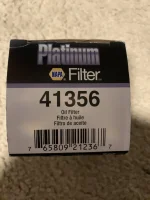- Joined
- May 28, 2014
- Messages
- 2,515
To anyone that is interested and lives near a Meijer store, you can buy any Fram product this week for 25% off. Many common Fram Ultra filters are only ~$7.
I would buy a Royal Purple oil filter because my favorite color is purple and they have those neat purple anti-drainback valve.
Well, speaking of that color purple. I just changed oil last week and used RP HMX 5w30

